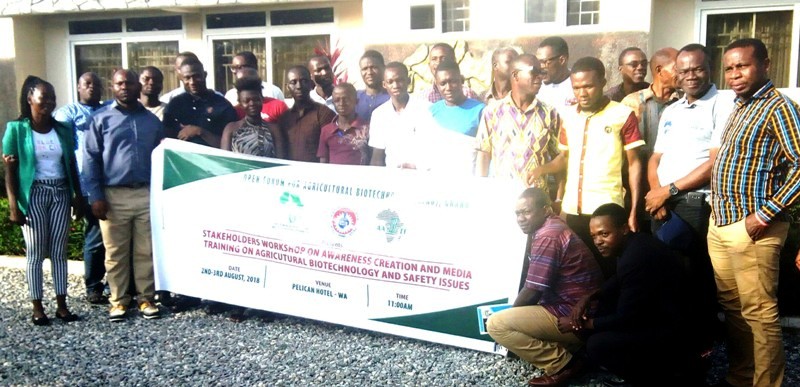OFAB Ghana engages journalists on genetically modified crops
 More than 30 journalists from 20 media organisations in the Upper West have undergone work out sessions on the status of biotechnology and genetically modified crops in Ghana.
More than 30 journalists from 20 media organisations in the Upper West have undergone work out sessions on the status of biotechnology and genetically modified crops in Ghana.
The session is aimed at deepening the understanding of the media on importance of science-biotechnology, particularly to food security and sharpen their skills to report effectively on new research outcomes and technologies.
Speaking on Genetically Modified Organism (GMO) seeds and how they were made, Professor Kenneth Danso, the Director of Biotechnology and Nuclear Agricultural Research Institute urged journalists to help to educate farmers to embrace new technologies to improve yields.
He said farmers required improved seeds which had been certified to be good and that it was only proper to adopt modern methods of crop improvement technologies in order to produce more output.
He also debunked the notion that GMO foods posed health hazards saying: “Man has been eating GMO food for the past 20 years, but there is no reports of death, they are there to complement local foods”.
The training was organised by Open Forum on Agricultural Biotechnology (OFAB) Ghana Chapter and anchored on the topic: “Exemplary Journalism, credible science reporting and better public understanding of science technology and innovation”.
“There is no difference between GMO food and non-GMO food,” he added.
Scientists say GMOs are Organisms (plants/animals/
Dr Richard Ampadu-Ameyaw, the National Coordinator of OFAB Ghana said the intention of GMOs was to increase yield, decrease pesticide use, decrease farm labour or increase nutritional value and others as a way to improve farm income, welfare and local development.
He also explained that biotechnology was another breeding technique which employs biological organisms or parts thereof through biological processes for the production of products and services of use to mankind.
He said currently there was no biotech crop commercialised in the country but noted that two crops were in the confined field trial that was cowpea and cotton.
Biotech crops are the fastest adopted crops, according to reports by scientists who say in 2017 alone, over 17 million farmers planted biotech crops on about 189.9 mHa of land, representing a 3 per cent increase from 2016.
The reports also say major crops under cultivation included; Soybean (50 per cent), Maize (31 per cent), Cotton (13 per cent) and Canola (5 per cent) as well as others (1 per cent).
But Ghana is yet to introduce GMO foods into its local market and allow farmers to acquire the seeds for production to reap the benefit of mass production and get disease resistant crops that could also withstand harsh weather conditions.
The journalists praised organisers of the programme as insightful and enlightening that would help raise the fortune of agriculture in the country.
Speaking to the GNA, Ms Marvis Okyere, a journalist with Radio Progress, said: “I think it was in-depth and enlightening, people were against GMOs, but per the explanation given by the experts, it is good for Ghana”.
“The experts were able to disabuse the misconceptions about the whole thing that GMO foods are bad, and I think the point that GMO is not in the market and that some crops are under confined trial is also good.”
The training was expected to help journalists to promote public education on biotechnology and help local farmers and stakeholders in agriculture to embrace new research ideas for increased productivity.
OFAB Ghana is a member of OFAB Africa group, which aims at creating awareness on biotechnology and genetically modified organisms in Africa.
In Ghana, the project is hosted by the Council for Scientific and Industrial Research.
Source: GNA
